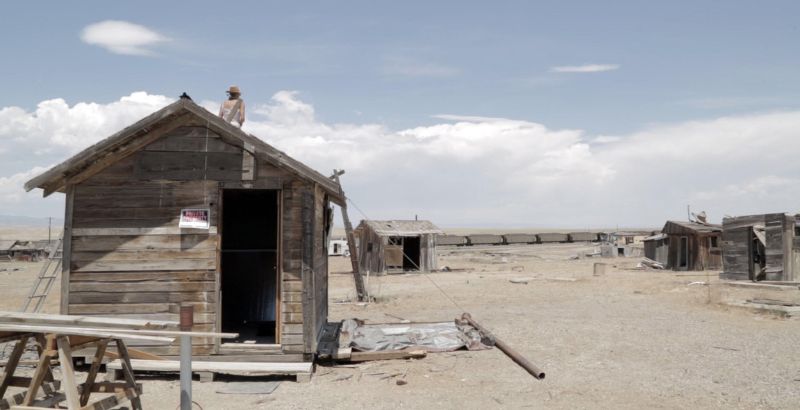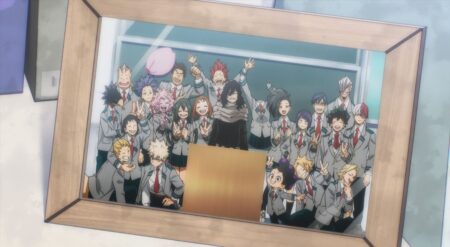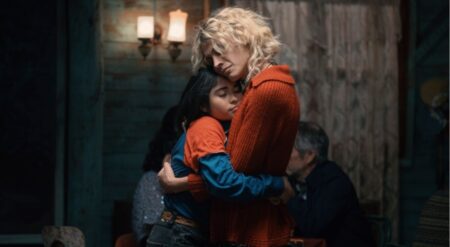Guest Author: Austin Zook
Screening as part of the Slamdance Film Festival, Emily Kaye Allen’s Cisco Kid is a work of cinema verité that invites viewers to join a young queer person as they attempt to build a new life for themselves in the modern American West. The film follows Eileen, who moves from Chicago to the literal ghost town of Cisco, Utah, and begins converting the dilapidated structures on their plot of land into a home.
Allen wields her camera like a paintbrush, composing shots that highlight the stark, uncompromising beauty of the Utah landscape and intermixing these with scenes of Eileen making their mark on Cisco. They build a wall of tires, repair a roof, salvage structures, and explore the surrounding area. As remote as Cisco is, they are rarely alone for long and Allen weaves a colorful cast of characters into the documentary—people simply passing through, tourists, and friends and acquaintances of Eileen’s make regular appearances.
Early on in the film, Eileen and Allen spend time with railroad workers whose train is stopped near Cisco. According to Allen, interactions like this with outsiders were more sporadic early in the process, before the seasons changed and tourists became a more regular occurrence.
“It…shows a snapshot of that part of the west, or at least people moving through it whether they live there or not,” says Allen. “I think Eileen didn’t anticipate how many people would come through… In the beginning it was just here and there like those train guys. Once Eileen spent their first summer there, that was when they realized there were so many tourists… I think they didn’t expect so many people coming through and wanting to check the place out. But I loved it as a filmmaker and there’s so many interesting, fun people.”
Visitors or no, the landscape Eileen works in is simultaneously breathtaking and a constant reminder of how precarious their situation is, living on the fringes of modern society. “It’s not completely isolated…it’s right off the freeway, but yet Eileen is very much on their own there,” says Allen, remarking on Cisco’s remote location. “They have to plan to load up on water or groceries. And…if they need any kind of help it might take hours for help to arrive.”
For all its challenges, Allen has seen audiences respond to Eileen’s work, adding, “I think a lot of people have a fantasy of living off the grid or building their own thing, and this is a version of that, but it’s a much harder version.”
The film is short on backstory for both Eileen and the town of Cisco, instead asking its audience to immerse themselves in the present moment. This in media res approach to the story makes for a compelling slice-of-life presentation that allows viewers to map meaning and hone in on specific moments or broader themes that appeal to them.
Broadly, Allen does not ascribe a single overarching message to Cisco Kid, instead hoping audiences will interpret and respond to the work individually. “When I first started showing this to people for…feedback, everyone came away with something just a little different,” says Allen. “And I think that’s great. There’s no one message, but I think there are themes in the film that people can really relate to or find intriguing.”
Accordingly, while Cisco Kid is not intended to impart a specific lesson to viewers, Eileen’s project is inherently a representation of the class divide in America, showing the challenges that someone without a deep reservoir of wealth to fall back on faces when building an unconventional life.

Allen embraces this aspect of the film, saying, “It…shows the reality that if you try to do that and you’re not someone who comes from money, it’s really hard. [In the film,] Eileen says if their car breaks down, [their life in Cisco is] over, and I think that’s reality for a lot of people in America; one medical bill or one car problem and it can really send people into a stressful position financially… I think seeing how Eileen keeps persevering and being stubborn, sticking to the thing, is inspiring and interesting for anyone that has a project or is a creative person.”
While Eileen does occasionally express doubts about their endeavor, Cisco Kid ultimately presents as a celebration of individuality and perseverance. Eileen sums this up at one point in the documentary, saying, “I don’t think it’s a waste to work on something, to make it your own thing. To build your own house. To make your own life.”
As of this writing, Eileen is continuing their work in Cisco, having recently purchased another plot of land in the area and started a Patreon where subscribers can follow their progress.
For anyone unable to attend Slamdance but hoping to see Cisco Kid, Allen is hopeful about the film’s prospects of playing in art house theaters before finding a home online.







